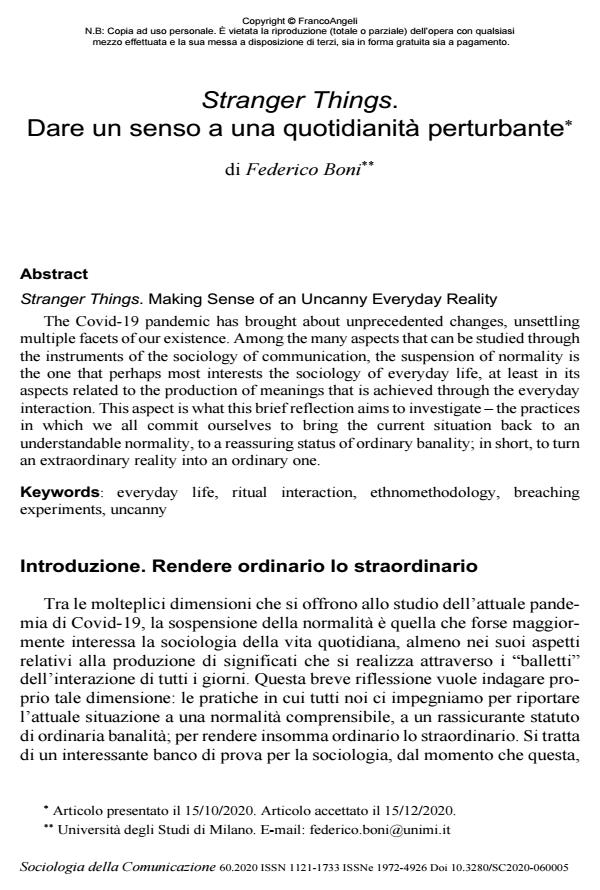Stranger Things. Making Sense of an Uncanny Everyday Reality
Journal title SOCIOLOGIA DELLA COMUNICAZIONE
Author/s Federico Boni
Publishing Year 2021 Issue 2020/60
Language Italian Pages 11 P. 46-56 File size 284 KB
DOI 10.3280/SC2020-060005
DOI is like a bar code for intellectual property: to have more infomation
click here
Below, you can see the article first page
If you want to buy this article in PDF format, you can do it, following the instructions to buy download credits

FrancoAngeli is member of Publishers International Linking Association, Inc (PILA), a not-for-profit association which run the CrossRef service enabling links to and from online scholarly content.
The Covid-19 pandemic has brought about unprecedented changes, unsettling multiple facets of our existence. Among the many aspects that can be studied through the instruments of the sociology of communication, the suspension of normality is the one that perhaps most interests the sociology of everyday life, at least in its aspects related to the production of meanings that is achieved through the everyday interaction. This aspect is what this brief reflection aims to investigate - the practices in which we all commit ourselves to bring the current situation back to an understandable normality, to a reassuring status of ordinary banality; in short, to turn an extraordinary reality into an ordinary one.
Keywords: Everyday life, ritual interaction, ethnomethodology, breaching experiments, uncanny
- Bearn G.C.F. (1993), Wittgenstein and the Uncanny, in «Soundings», 76, 1, pp. 29-57.
- Bonini T. (2020), L’immaginazione sociologica e le conseguenze sociali del Covid-19, in «Mediascapes», 15, pp. 13-23, -- testo disponibile in: https://ojs.uniroma1.it/index.php/mediascapes/article/view/16762/16120
- Di Cesare D. (2020), Virus sovrano? L’asfissia capitalistica, Bollati Boringhieri, Torino.
- Fuchs Ch. (2020), Everyday Life and Everyday Communication in Coronavirus Capitalism, in «Triple C», 18, 1, pp. 375-399.
- Giglioli P.P. (1990), Rituale, interazione, vita quotidiana. Saggi su Goffman e Garfinkel, CLUEB, Bologna.
- Giordano P. (2020), Nel contagio, Einaudi, Torino.
- Goffman E. (2001), Frame Analysis. L’organizzazione dell’esperienza, Armando Editore, Roma.
- Gouldner A.W. (1972), La crisi della sociologia, il Mulino, Bologna.
- Lévy B.-H. (2020), Il virus che rende folli, La nave di Teseo, Milano.
- Luhmann N. (1982), Il senso del nonsenso, in Meneghetti, P., Trombini, S. (a cura di), Le rovine del senso, Cappelli, Bologna, pp. 132-140.
- Morin E. (2020), Cambiamo strada. Le 15 lezioni del Coronavirus, Raffaello Cortina, Milano.
- Ronchi R. (2020a), Teologia del virus, in «Doppiozero», 6 aprile, testo disponibile in: -- https://www.doppiozero.com/materiali/teologia-del-virus.
- Ronchi R. (2020b), Il teatro del virus, in «Doppiozero», 15 maggio, -- testo disponibile in: https://www.doppiozero.com/materiali/il-teatro-del-virus.
- Royle N. (2003), The Uncanny, Manchester University Press, Manchester.
- Sacks H. (2007), L’analisi della conversazione, Armando, Roma.
- Solito L., Sorrentino C. (2020), Dalla distanza sociale alle relazioni orizzontali. Appunti per un domani ormai alle porte, in «Mediascapes», 15, pp. 59-68, -- testo disponibile in: https://ojs.uniroma1.it/index.php/mediascapes/article/view/16811/16124
- Wolf M. (1979), Sociologie della vita quotidiana, Espresso Strumenti, Milano.
- Wolf M. (1981), Postfazione a Goffman E., Relazioni in pubblico, Bompiani, Milano, pp. 307-323.
- Žižek S. (2020), Virus. Catastrofe e solidarietà, Ponte alle Grazie, Milano.
Federico Boni, Stranger Things. Dare un senso a una quotidianità perturbante in "SOCIOLOGIA DELLA COMUNICAZIONE " 60/2020, pp 46-56, DOI: 10.3280/SC2020-060005